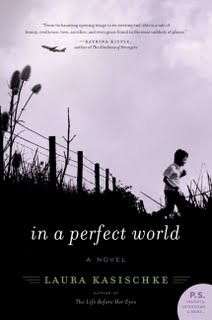Laura teaches in the University of Michigan MFA program and the Residential College, and she is the author of seven poetry collections and seven novels.
 The idea for the novel In a Perfect World came to me while I was immersed in two very different books. The first was the book The Great Mortality by John Kelly, a history of the Black Death, which I was reading two summers ago mostly in a chair at the edge of the public pool while keeping an eye on various children in my care. While reading, the writer's question occurred to me:
The idea for the novel In a Perfect World came to me while I was immersed in two very different books. The first was the book The Great Mortality by John Kelly, a history of the Black Death, which I was reading two summers ago mostly in a chair at the edge of the public pool while keeping an eye on various children in my care. While reading, the writer's question occurred to me:What if?
What if a plague happened here --- starting slowly, caused by things we couldn't understand, trickling across the landscape in terrifying bits instead of the gigantic cataclysms we often dread? Who would we become?
I was also reading fairy tales of all kinds at this time, luxuriating in the tale-ness of them, the unabashed ways they promoted their own agendas, set forth their archetypes, challenged them unreasonably, and followed their progress.
It was this combination of reading a book about a kind of apocalypse and reading fairy tales full of mysterious details and familiary types that led the way for me. I wanted my narrative be a "fairy tale gone wrong," but redemptive, too, in the way that even the darkest fairy tale is usually redemptive.
At the outset, the protagonist in my novel is the kind of woman I've been myself off and on at various points in my life --- except that I gave her the attributes of a Cinderella: her patience, her goodness, her extraordinary beauty, her naivete --- none of that is mine! But, at heart, like so many princesses, fictional and non-fictional, she wants romance. In the end, she does not have the fairy tale romance she wanted, but by rising to the challenges she's given, she has something richer and more important, in my opinion, in the end.
The kind of writing I really love is sensual stuff --- the sky and the weather and smell of a child's hair --- so I work extra hard when writing a novel to give the reader something to fear or anticipate or a question to find an answer to, so he or she will be more likely (hopefully) to indulge my lingering on imagery so long.
I knew that a step-family would add "instant conflict," just as it does in a fairy tale, and that an epidemic sweeping the land would be upping the ante on that considerably, so I felt an additional need to keep the focus on the domestic details, and the crises in the larger world acted as a kind of landscape, a stage set. This is also how I imagine that such disasters occur in real lives:
First a distant rumor, and then, for long periods perhaps, a peaceful denial, and then a little closer trouble, followed by a reprieve and a forgetting, etc. But, in the meantime, you've got to scramble some eggs for your kids and get the laundry folded.
The fairy tale choices I intersperse in the story were deliberately chosen, and inspired many aspects of the novel. Mostly they were mother/child stories, which always involve so much conflict and heartache, especially Hans Christian Andersen's. His "The Story of a Mother" was on my mind the whole time I was working on the novel --- and if you haven't read that one before, get out some Kleenex before you do! I feel there is so much to learn from the past, from history, and from the long traditions of tales. In a Perfect World was my way of trying to pay tribute, in a little way, to that.
---Laura Kasischke

